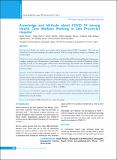Please use this identifier to cite or link to this item:
https://hdl.handle.net/20.500.14356/1295| Title: | Knowledge and Attitude about COVID 19 among Health Care Workers Working in Seti Provincial Hospital |
| Authors: | Parajuli, Janaki Mishra, Pradip Sharma, Seema Bohora, Krishna Bahadur Rathour, Pratiksha Singh Joshi, Jagadish Kamar, Sher Bahadur Pandey, Hemaraj Chaudhary, Ashok |
| Citation: | ParajuliJ., MishraP., SharmaS., BohoraK. B., RathourP. S., JoshiJ., KamarS. B., PandeyH., & ChaudharyA. (2020). Knowledge and Attitude about COVID 19 among Health Care Workers Working in Seti Provincial Hospital . Journal of Nepal Health Research Council, 18(3), 466-471. https://doi.org/10.33314/jnhrc.v18i3.2816 |
| Issue Date: | 2020 |
| Publisher: | Nepal Health Research Council |
| Article Type: | Original Article |
| Keywords: | Attitude COVID-19 Health care worker Knowledge. |
| Series/Report no.: | Jul-Sep 2020; |
| Abstract: | Abstract Background: Health care workers are at greater risk of infection during COVID 19 pandemic. This study was carried out to assess the knowledge and attitude toward COVID-19 among healthcare workers at working at Seti Zonal Hospital. Methods: A cross-sectional study was performed between April and May 2020 at Seti Zonal Hospital with purposive sampling technique and self-administered questionnaire of the knowledge and attitude of healthcare workers regarding COVID-19. The demographic characteristics mean knowledge and attitude score of healthcare workers were identified and inferential statistics t-test, ANOVA and Spearman’s correlation were used to show the relationship between variables. Results: A total of 230 healthcare workers (92% response rate) had a mean score of knowledge and attitude of 8±0.88 and 7.88±1.32, respectively with good knowledge and a low positive attitude. Majority (94.7%) were familiar with the sign and symptoms, agreed that chronic diseases patients and HCWs are at a higher risk (97%) and (87.8%) respectively while knowledge related to COVID 19 vaccination, isolation period and treatment by antibiotics was poor with low positive attitude towards information availability about COVID 19 (41%), government ability to control the epidemic (49%), and the family members might get infection (60%). There was a positive correlation between knowledge scores and attitude scores (r=0.28, p<0.0001). Conclusions: We identified a significant gap in information source, sufficient knowledge and low positive attitude about COVID 19 among health care workers. Greater educational efforts about prevention should be directed to different level of health workers. Keywords: Attitude; COVID-19; health care worker; knowledge. |
| Description: | Original Article |
| URI: | http://103.69.126.140:8080/handle/20.500.14356/1295 |
| ISSN: | Print ISSN: 1727-5482; Online ISSN: 1999-6217 |
| Appears in Collections: | Vol. 18 No. 3 (2020): Vol. 18 No. 3 Issue 48 Jul-Sep 2020 |
Files in This Item:
| File | Description | Size | Format | |
|---|---|---|---|---|
| 2816-Manuscript-18843-1-10-20201115.pdf | Fulltext Article. | 220.22 kB | Adobe PDF |  View/Open |
Items in DSpace are protected by copyright, with all rights reserved, unless otherwise indicated.
